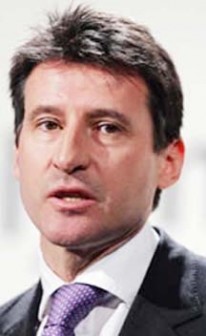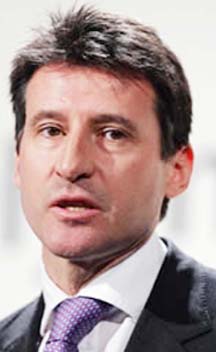LONDON, (Reuters) – For Sebastian Coe, London 2012 has entered the ‘Killing Zone’, a crucial stretch that will determine whether the Games meet the Olympic gold standard in one year’s time or fall back among the also-rans.

Speaking in purely athletic terms, lest anyone be shocked by the expression, the chairman of Games organisers LOCOG said yesterday that the next 12 months were of critical importance.
“In terms of an 800 (metre race)…I think this is between 500 and 600 metres, the second lap and in 800 metre running that’s known as the ‘Killing Zone’,” the double 1,500 metre Olympic gold medallist told a Reuters ‘Newsmaker’ event.
“And it’s how you come out of that 100 metres that often determines the order that you finish in.”
London marks the year to go point on Wednesday, the Games opening on July 27 next year with the showcase ceremony in the 80,000 seat Olympic Stadium.
Ever the athlete, and Coe is one of the all-time greats as the only man to have won 1,500 golds at successive Games, in 1980 and 1984, the Briton was prepared for all eventualities but confident London would rise to the challenge.
UNDER CONTROL
He said there was nothing that really kept him awake at night, was confident London had the best people an organising committee has ever assembled.
“I guess what I would say at this moment is that what we have within our control is under control,” he said, before being joined by Sports and Olympics Minister Hugh Robertson.
“But I am not that cavalier that I don’t recognise there are things that will come at us in the last year that you don’t always foresee.”
Transport and security are two of the key issues but the immediate focus is on the ‘London Prepares’ test events that will take place across the capital in the coming months.
Some have already happened, others are in the final stages of preparation but all are vital to ironing out any problems.
“Testing is such a crucial part of the process. Nobody wants to go to an Olympic final and risk being thrown something you haven’t confronted with 200 times before on the training track,” said Coe.
“The challenges going forward are making sure we learn as much as we possibly can from the testing…that our teams are all pointing in the right direction and all focusing absolutely on the things that need focusing on and over the coming year we know what those are.”
As an athlete, Coe was famed for his smooth acceleration and late bursts from behind. There is no question of London being off the pace either.
All but one of the Olympic Park venues have been completed and handed over with more than a year to go and there is talk of the Games coming in under an albeit repeatedly expanded budget.
“I broke 11 world records and five of them were running from the front. I think it’s a pretty reasonable tactic. But you have to be adaptable,” said Coe.
Transport will be one of the big pieces of the project that have to be got right.
“You can’t by conscience bring them (the athletes) to a city where transport unravels within 10 minutes of the opening ceremony, or bring them to venues that don’t work or a village that isn’t creating that ambience or environment that they need to compete at the highest level,” he said.
For those who complained about the ‘Olympic Lanes’ and transport making it harder to get around town next year, Coe had a simple answer.
“This is not going to be business as usual,” he said. “It is going to be business unusual.”

